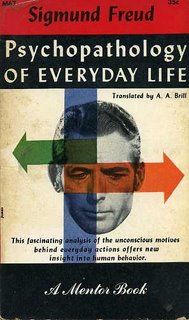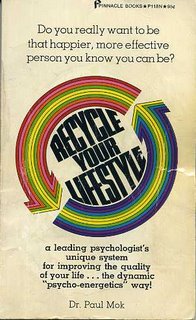
It’s unusual when psychiatric nurses are required to learn about new medical technology. We don’t use many medical gadgets because our focus is on our patients’ mental health. As a psychiatric nurse, my practice primarily involves the use of medications and talk therapy. That, however, wasn't always the case in psychiatric medicine. For example, this patient is being treated with hydrotherapy, also known as a hepatic douche. No, I’m not kidding, look at the fine print at the bottom of the picture. I found this picture in a book that was written and published by Dr. John Harvey Kellogg of Battle Creek, Michigan. He was the medical director of the Battle Creek Sanitarium. He believed that good food, exercise, and a daily dousing of water—inside and out—could cure any illness known to mankind. Dr. Kellogg came up with all kinds of gizmos that look funny today, but they were considered on the cutting edge at the turn of the twentieth century.

I’ve noticed that different types of talk therapy fall in and out of favor over the years, and I’ve seen a lot of changes throughout my nursing career. My nursing instructors believed that Freud was God, and taught us about the power of psychoanalysis. I never bought into the theory, which got me into hot water when I was in class. My psychiatric nursing instructor got rather peeved every time I rolled my eyes and giggled during her lectures. I reminded her on more than one occasion that sometimes, a cigar is really just a cigar. By the way, Sigmund Freud wasn’t only the father of modern psychoanalytic, he was the father of pop psychology books. In Psychopathology of Everyday Life, published in 1951, Freud is the first to bring modern psychiatry to the masses. This book first introduced the American public to the concepts of the Freudian slip and repression. If you ever find this book in good condition at a thrift store or flea market, grab it. This book is a first edition and it’s worth a lot of money.

Welcome to the days of lava lamps, Jimi Hendrix, and tie-dye shirts. This book is about recycling your life style the psycho-energetics way. Doesn’t that sound far out? Recycle Your Lifestyle was written by Dr. Paul Mok and was published in 1972. Dr. Mok tells readers that if they are ready for an “exciting lift off,” he will provide the answers to help them find nirvana. He tells readers how to recharge their psychic energy systems and resist and control negative energy forces while “getting it together.” I saw some doctors use this type of approach with their patients during the early days of my nursing career, but I doubt that today's HMOs would think that this type of therapy is groovy.

And speaking of HMOs, check this out, and no, I'm not making this up. Brief therapy is now becoming very popular because HMOs refuse to pay for long-term treatment. During brief therapy, the therapist asks the patient what’s the problem, and then tells the patient if it works, do more of it, and if it doesn’t work, do something else. That’s it; they slap a Band-Aid on psychological issues and call it a day. Sad, isn’t it? I wonder what they are going to come up with next? Maybe we will go back to using hydrotherapy.
 It’s unusual when psychiatric nurses are required to learn about new medical technology. We don’t use many medical gadgets because our focus is on our patients’ mental health. As a psychiatric nurse, my practice primarily involves the use of medications and talk therapy. That, however, wasn't always the case in psychiatric medicine. For example, this patient is being treated with hydrotherapy, also known as a hepatic douche. No, I’m not kidding, look at the fine print at the bottom of the picture. I found this picture in a book that was written and published by Dr. John Harvey Kellogg of Battle Creek, Michigan. He was the medical director of the Battle Creek Sanitarium. He believed that good food, exercise, and a daily dousing of water—inside and out—could cure any illness known to mankind. Dr. Kellogg came up with all kinds of gizmos that look funny today, but they were considered on the cutting edge at the turn of the twentieth century.
It’s unusual when psychiatric nurses are required to learn about new medical technology. We don’t use many medical gadgets because our focus is on our patients’ mental health. As a psychiatric nurse, my practice primarily involves the use of medications and talk therapy. That, however, wasn't always the case in psychiatric medicine. For example, this patient is being treated with hydrotherapy, also known as a hepatic douche. No, I’m not kidding, look at the fine print at the bottom of the picture. I found this picture in a book that was written and published by Dr. John Harvey Kellogg of Battle Creek, Michigan. He was the medical director of the Battle Creek Sanitarium. He believed that good food, exercise, and a daily dousing of water—inside and out—could cure any illness known to mankind. Dr. Kellogg came up with all kinds of gizmos that look funny today, but they were considered on the cutting edge at the turn of the twentieth century.  I’ve noticed that different types of talk therapy fall in and out of favor over the years, and I’ve seen a lot of changes throughout my nursing career. My nursing instructors believed that Freud was God, and taught us about the power of psychoanalysis. I never bought into the theory, which got me into hot water when I was in class. My psychiatric nursing instructor got rather peeved every time I rolled my eyes and giggled during her lectures. I reminded her on more than one occasion that sometimes, a cigar is really just a cigar. By the way, Sigmund Freud wasn’t only the father of modern psychoanalytic, he was the father of pop psychology books. In Psychopathology of Everyday Life, published in 1951, Freud is the first to bring modern psychiatry to the masses. This book first introduced the American public to the concepts of the Freudian slip and repression. If you ever find this book in good condition at a thrift store or flea market, grab it. This book is a first edition and it’s worth a lot of money.
I’ve noticed that different types of talk therapy fall in and out of favor over the years, and I’ve seen a lot of changes throughout my nursing career. My nursing instructors believed that Freud was God, and taught us about the power of psychoanalysis. I never bought into the theory, which got me into hot water when I was in class. My psychiatric nursing instructor got rather peeved every time I rolled my eyes and giggled during her lectures. I reminded her on more than one occasion that sometimes, a cigar is really just a cigar. By the way, Sigmund Freud wasn’t only the father of modern psychoanalytic, he was the father of pop psychology books. In Psychopathology of Everyday Life, published in 1951, Freud is the first to bring modern psychiatry to the masses. This book first introduced the American public to the concepts of the Freudian slip and repression. If you ever find this book in good condition at a thrift store or flea market, grab it. This book is a first edition and it’s worth a lot of money. Welcome to the days of lava lamps, Jimi Hendrix, and tie-dye shirts. This book is about recycling your life style the psycho-energetics way. Doesn’t that sound far out? Recycle Your Lifestyle was written by Dr. Paul Mok and was published in 1972. Dr. Mok tells readers that if they are ready for an “exciting lift off,” he will provide the answers to help them find nirvana. He tells readers how to recharge their psychic energy systems and resist and control negative energy forces while “getting it together.” I saw some doctors use this type of approach with their patients during the early days of my nursing career, but I doubt that today's HMOs would think that this type of therapy is groovy.
Welcome to the days of lava lamps, Jimi Hendrix, and tie-dye shirts. This book is about recycling your life style the psycho-energetics way. Doesn’t that sound far out? Recycle Your Lifestyle was written by Dr. Paul Mok and was published in 1972. Dr. Mok tells readers that if they are ready for an “exciting lift off,” he will provide the answers to help them find nirvana. He tells readers how to recharge their psychic energy systems and resist and control negative energy forces while “getting it together.” I saw some doctors use this type of approach with their patients during the early days of my nursing career, but I doubt that today's HMOs would think that this type of therapy is groovy. And speaking of HMOs, check this out, and no, I'm not making this up. Brief therapy is now becoming very popular because HMOs refuse to pay for long-term treatment. During brief therapy, the therapist asks the patient what’s the problem, and then tells the patient if it works, do more of it, and if it doesn’t work, do something else. That’s it; they slap a Band-Aid on psychological issues and call it a day. Sad, isn’t it? I wonder what they are going to come up with next? Maybe we will go back to using hydrotherapy.
And speaking of HMOs, check this out, and no, I'm not making this up. Brief therapy is now becoming very popular because HMOs refuse to pay for long-term treatment. During brief therapy, the therapist asks the patient what’s the problem, and then tells the patient if it works, do more of it, and if it doesn’t work, do something else. That’s it; they slap a Band-Aid on psychological issues and call it a day. Sad, isn’t it? I wonder what they are going to come up with next? Maybe we will go back to using hydrotherapy.













9 Comments:
I guess that type of psychiatry looked groovy back then.
I love this book
The Quiet Room: A Journey Out of the Torment of Madness.
There's a film from a few years ago about the freaky things that went on at Kellogg's colonic clinic. If you want to be grossed out, rent "The Road to Wellville."
Hello! Will you email me? I have a question about advertising on your blog.
jenny at blogher dot org
I used to love Corn Flakes until I heard more about Dr. Kellogg - ever see the SNL sketch "Colon Blow". I giggle every time my girls ask for the cereal now!
Thanks for the recap MJ!
In the 34 years I have been a psych patient, I have seen fads in therapy come and go. When a stable environment is important to maintain, having a healthcare worker suddenly start spouting gibberish and pushing/pulling you in a different direction makes one wonder if THEY have gone crazy or if one has gone crazIER.
I remember back in my last hospitalization in 1990...while I was in there the buzz phrase that was hurled at us every waking moment was "What's the Pay-off? [for our insanity, crazy stuff, self-destructive behavior, etc]"
At the moment I am being tortured with Positive Psychology. While I can understand an inkling of it and why it can work in some instances, I still see it largely as magical thinking on the part of the therapist.
This comment has been removed by a blog administrator.
Are you suggesting that Dr. Kellogg was a bit flaky?
He was corny, too.
Post a Comment
<< Home